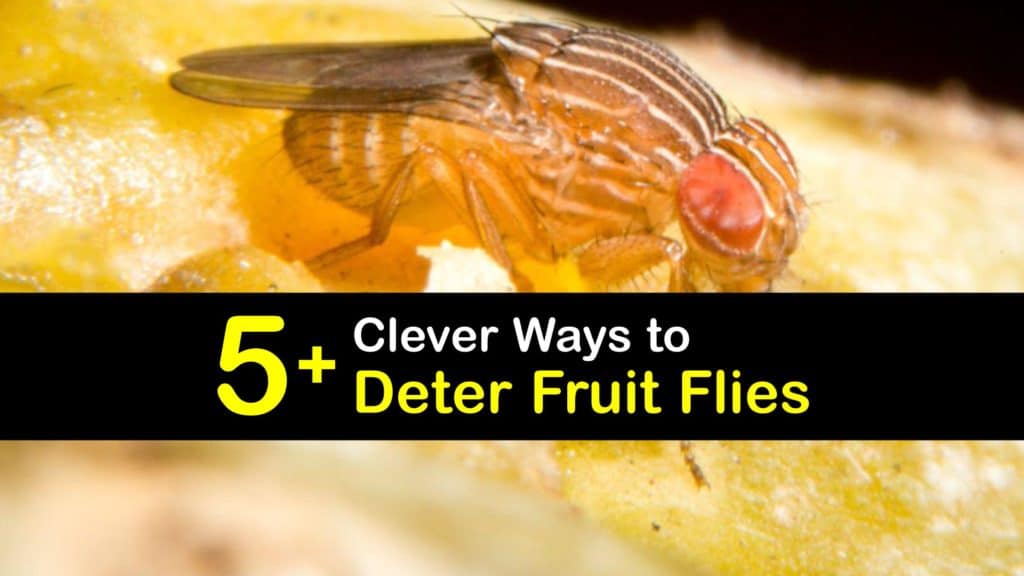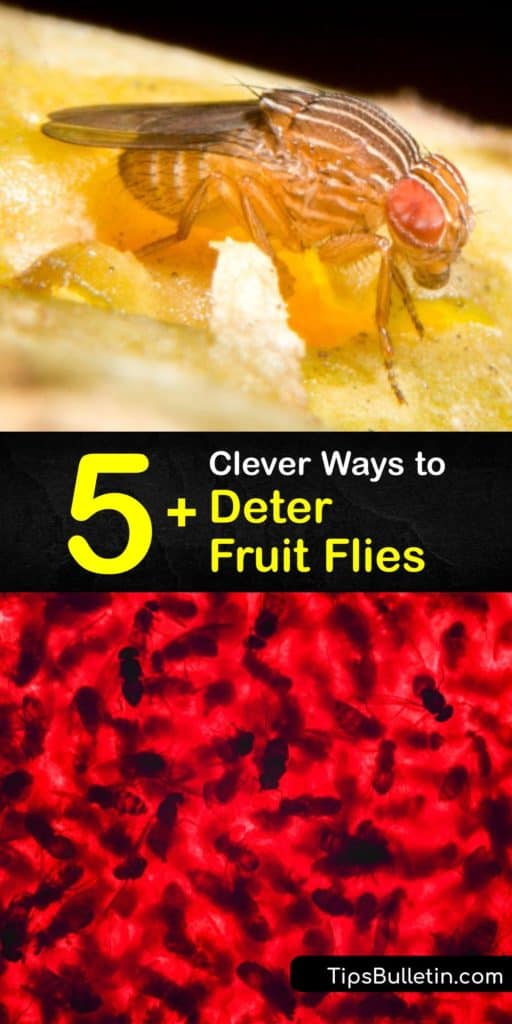The presence of pesky fruit flies in your home is more than a minor annoyance. Like many flies, fruit flies feed on decaying organic matter, and in the process of feeding, they carry bacteria. Create a homemade fruit fly deterrent with our help to keep fruit flies out of your kitchen and away from your fruit.
If you find fruit flies buzzing around your kitchen, it’s wise to clean and disinfect any surfaces you cook or eat on and any produce left in the open. Fruit flies spread disease-causing bacteria like E. Coli and salmonella through contact with items where they land. Adult fruit flies lay fruit fly eggs on decaying material to allow their larvae to feed microorganisms that help decay fruit and the sugar within the fruit itself.
Dealing with fruit flies involves cleaning, inventive measures to get rid of any flies inside your home, and methods to keep new flies from getting inside. Many of the most effective homemade remedies for fruit flies and other pests won’t cost anything and only involve a handful of household supplies.

How to Deter Fruit Flies
The sugar in fruit attracts flies, and so do the smells emitted by decomposing food. The easiest way to eliminate the fruit fly population in your home is to keep these items away or covered. If you’re still having issues with fruit flies, continue reading for natural ways to control fruit fly activity.
DIY Fruit Fly Trap
Fruit flies are year-round pests; however, their most prominent activity is during the late summer and fall months when crops are ripening for harvest.
If you grow fruits and vegetables or leave fresh fruit out often, create a simple DIY trap to prevent a fruit fly infestation. A trap made using sugar water and liquid dish soap is one way to deter fruit flies from feeding on ripe fruit.

Mix granular sugar and warm water in a bowl until completely dissolved or place a piece of overripe fruit in the water. Add a tablespoon of dish soap to reduce the surface tension of the water, causing flies that visit the water to feed on the sugar or fruit to fall in and drown.
Homemade Fruit Fly Spray
Sometimes the best offense against a fruit fly problem is to keep your home clean and reduce the food sources of these pests. A cleaning solution made with rubbing alcohol and dish soap cleans and sanitizes surfaces in your kitchen and makes an excellent homemade spray to kill fruit flies on plants, fruit, and around the house on contact.
Pour rubbing alcohol and water in equal parts in an eight-ounce spray bottle with liquid dish soap. Shake well to combine before using the spray to clean your kitchen and any areas fruit flies target. Rinse surfaces that come in direct contact with food before using them.
Keep Flies Out of the Kitchen with a Trap
Because you know that the sugar in fruit and odors from decomposing foods entice fruit flies, use this for trapping fruit flies at home. Draw them into a trap to keep them out of your kitchen.
Pour apple cider vinegar into the container to cover the bottom with a small amount of rubbing alcohol and seal the top with plastic cling wrap. Poke a few holes into the plastic with a fork to allow flies to enter the trap.
The smell of apple cider vinegar attracts flies, allowing the rubbing alcohol to kill them. Other types of vinegar like red wine vinegar and balsamic vinegar work as substitutes for apple cider vinegar.
Keeping Flies Out of the Drain
If you regularly clean the fruit bowl and keep it free of rotten fruit but still have a fruit fly problem, your drain and garbage disposal may be to blame.
When you wash dishes, bits of food flow into the drain and become stuck; these food bits provide nutrition and a hiding place for fruit flies. To get rid of drain flies, create a drain cleaner to clean the drain and remove any traces of food.
To make a drain cleaner, combine salt, baking soda, and vinegar in a bowl. Increase the amount of the mixture if you are cleaning more than one drain. Pour the mix down your drains to allow the acidic nature of vinegar to dissolve any food residue.
Following a drain treatment, fill your sink with water and let it run through the drains. To ensure you kill any flies and eggs in the sink, bring a pot of water to boil and pour it down the drain after the vinegar mixture.
Herbs: A Natural Fruit Fly Deterrent
Aromatic herbs make an excellent natural fruit fly deterrent because the essential oils inside many plants act as a fruit fly repellent. To prevent fruit flies from entering the house, add potted herb plants around your home to create an outdoor fruit fly deterrent.
Plants like peppermint, clove, and lavender have a pleasant aroma to us, but fruit flies can’t stand the smell. A mini garden of insect-repelling plants is the perfect natural fruit fly deterrent. These plants are also effective at repelling fungus gnats.
The Best Way to Deter Fruit Flies
The best indoor fruit fly deterrent starts with keeping your home clean and free of food sources for fruit flies. Without a food source, you’re less likely to see any flies, and any flies present indoors won’t have a source of nutrition or be able to lay their eggs.
Disposing of Food
Avoid food residue in your sink by scraping food into garbage cans and securing the lids to keep the smell of decomposing food from attracting fruit flies. Regularly take out the trash and avoid leaving fruit out too long.
Once fruits and vegetables are brought inside or purchased from the grocery, they begin to lose freshness, and over a week, you could have rotten fruit. While the smell may not be immediately noticeable to us, it draws in fruit flies looking for food.
Homemade Fruit Fly Deterrent
When it comes to repellents, basil is a helpful herb that repels insects once you crush the leaves. Use a spray made with basil around your home to leave a scent that fruit flies hate.
Steep basil leaves in a cup of boiling water for 15 minutes. Remove the water from heat, allow it to cool, and add a cup of vodka. Strain the vodka water in a spray bottle and use it to repel fruit flies around your house.
If you don’t have any vodka in your house, consider using vinegar in its place. Vinegar is a natural fly repellent that will work just as well in this powerful spray.
Dealing with fruit flies is challenging because they mate and lay eggs quickly. These eggs are not always visible, but after they hatch, they start eating decomposing fruit 30 hours after adult fruit flies lay them. Keep an eye on fruit you leave out around your house and implement a natural deterrent to keep adult flies away.

If our homemade fruit fly deterrent tips helped you, please share our fruit fly deterring advice with your friends on Facebook and Pinterest who are looking for a way to deter fruit flies from entering their homes.